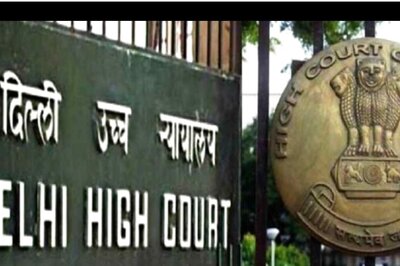
views
Lolab: Sickening teargas has contaminated the air. The narrow road — dotted with stones — surrounded by dense walnut trees is engulfed by the darkness of night. This is Tikipora, a nondescript village of scenic Lolab valley in the frontier area of north Kashmir’s Kupwara. The hamlet is nearly 130 kilometers north-east of J&K’s summer capital, Srinagar.
The day was distinct in the village. Thousands of people had gathered to attend the funeral of popular scholar-turned-militant commander, Mannan Wani. Later clashes broke out between protesters and the forces.
The only road to the village passes through beautiful hills and paddy fields but in-between are three military garrisons. Forces had put restrictions at several places and people were not allowed to move towards the village, however, people managed to come in large numbers. Some walked miles on foot, others came in the overloaded vehicles.
Wani, who joined militant group Hizbul Mujahideen in January this year, was pursuing doctorate degree from the Aligarh Muslim University (AMU). The geology scholar left from university to pick up the arms.
His pictures with the gun startled people and he became a “well-known commander”. While active as a militant, Wani also wrote two articles, something new in the current troubled history of Kashmir.
The write-ups were “powerful” and Mannan described his viewpoint of joining militancy, disparaging the establishment. One of the articles published by a Kashmir-based news agency was deleted by police.
“...we don’t feel dignity in death but we do feel dignity in fighting…,” he wrote in his first write-up.
On Thursday morning, a joint team of forces killed Wani at Satgund village of Kupwara — nearly 40 kilometers from his home — along with another militant Ashiq Zargar. Police managed to keep the news of his killing clandestine till afternoon to thwart law-and-order situation.
In the double story modest house, Mannan’s father, Bashir Ahmad Wani, 57, was sitting quietly in a packed wood-panelled room. “Chidiya chug gayi khet, ab kya pachtaye,” Bashir used an Urdu phrase which loosely means: There is no use repenting when the deed is done.
He is shaken and traumatised by the loss of his son, who was a shining student with a bright future. During the day, he fainted twice while trying to pacify the emotionally charged crowd who had come to participate in Mannan’s funeral.
Basheer, a government teacher by profession, asks in the broken voice: “Why did he pick up the gun? Why don’t we look at this?” He believes his son would not have met this fate “if people (leaders) would have been honest” in solving the Kashmir problem.
“Why are our kids doing this? Do we have to only fill graveyards?” Bashir asks helplessly. He says it was after the Hanging of Afzal Guru — who was sent to gallows in 2013 for attacking Indian parliament — that his son changed.
“Mannan was in Aligarh when Afzal Guru was hanged. That was the day his mind changed,” he told News18. “He was aggressive on phone.”
Mannan had his early education at the Jawahar Navodaya Vidyalaya (JNV) – a chain of central government-run schools—in a nearby village. At school, his friends say, he was a “full of life” person. “Other than being exceptional in studies, Mannan used to lead the co-curriculum activities. He was passionate about sports, volleyball and football,” his friend said.
He has science degree from Srinagar’s Amar Singh College. In 2011, Mannan got selected in the University of Kashmir for a master’s programme in Geology.
However, he wanted to go to Aligarh. After three months, he got selected in AMU for a post graduate course in the same subject, securing rank two. Basheer, who also completed his higher studies from the University of Kashmir and now teaches Urdu, says he urged Mannan to write the civil service exams.
“I used to give the example of Shah Faisal,” says Basheer, referring to first Kashmiri who topped Indian Civil Service Examination in 2009, who is also from the Kupwara district. “There is something beyond that as well, should I prove it to you,” Basheer recalls Mannan telling it to him once.
With white beard and skullcap, melancholic Basheer believes, his son has proven it. “This year Mannan would have completed his PhD,” he said. The reality is being concealed — believes Bashir — that is the reason that youth are joining militancy in Kashmir.
“Truth is not being told and those who try to tell are being stopped,” says Bashir. “This is the reason our youth are embracing death.” “My son would not have been allowed to write what he did after becoming a militant.”
Basheer believes his son could have used his knowledge in a prosperous way but blames the state and the circumstances. “My son was a learned person but he couldn’t utilise his knowledge in the way he could have. It is because the truth has become the casualty here. No one wants the truth to be told,” he says.
Mannan, as per his family, was deeply affectionate about his area and wanted to serve the local populace.
In his M Phil, he had studied the watershed characterisation of Lolab valley. During PhD, he was studying structural geology. The forces had told Basheer to persuade his son to surrender, which he refused.
“I told them (security agencies) that he has chosen the way for himself. It is better for me to maintain silence,” said Basheer adding that since Mannan joined militancy he has never met him or talked to him on phone.
Wani was believed to be active in south Kashmir, which is being seen as hot-bed of current militancy in Kashmir. He had also appeared in funerals of the militants in the south. However, as per police sources, he had shifted to north Kashmir recently and was trying to settle his base in the region of the valley which is also witnessing a surge in local militancy.
During the last 15 days, Basheer says, he was being regularly questioned by security agencies who told him that Mannan is in North Kashmir.
“From last 15 days, I was going through mental torture due to the regular summons by the security agencies. They were asking if I am in contact with Mannan?” says Basheer. “Even the houses of our relatives in other towns of north Kashmir were raided recently,” Basheer adds.
Dozens of books of Mannan are stacked in the cupboard of the room, Basheer gives a throbbing grin as he evokes a comment on social media by a friend of Mannan: “Your gun is not voicing your pen is voicing.” Militant like Mannan was being considered as a crucial “asset” of militants who were imperative for “propaganda.”
His father makes an emotional plea and doesn’t want any father to lose his son. He says that will be possible if the voice of people is listened to.
“We have to listen what our new generation is asking. The bloodshed has been happening from (19)47,” he utters. “How much more will we have to bear?”
Managing the Operations
Unlike the encounters of other top commanders in the past, police’s strategies proved effective on Thursday. The identity of Mannan was not revealed by afternoon. “Confusion was created among the people so that law and order problems don’t arise,” said a police official on the condition of anonymity.
Even the family of Mannan Wani was not told about his killing till afternoon. Police also did not allow the press to cover the funeral of Wani. The journalists were not allowed till he was not buried.
Some police officials believe that militant funerals are the major events where the local youth get “attracted” to the militant ideology. The police are also devising policies to contain the funeral procession of militants.
(The author is a Kashmir-based freelance journalist.)

















Comments
0 comment